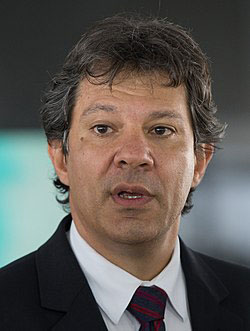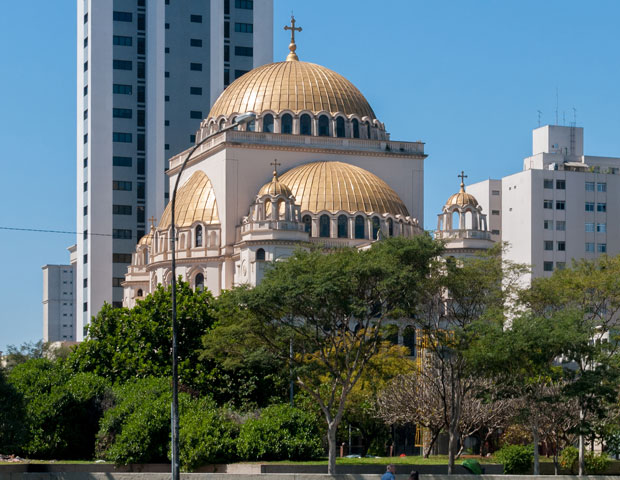Religion and Politics in Brazil: Orthodox Influences
by Graham McGeoch*

Former Mayor of Sao Paulo and presidential candidate Fernando Haddad
The recent elections in Brazil have once again placed religion and politics at the fore of public debates. Not surprisingly, the election of President Jair Bolsonaro has focused attention on the growing influence of Evangelicals in Brazilian politics. This factor is now frequently touted alongside the affirmation that Brazil is the largest Roman Catholic country in the world. While Bolsonaro is himself a Roman Catholic, his election campaign played to an alliance of Evangelicals and traditional Roman Catholics. In the final run-off, the Evangelical vote showed a 2 to 1 split in favor of Bolsonaro, while the Roman Catholic vote was equally distributed between both candidates. Bolsanaro’s opponent was the Orthodox Christian Fernando Haddad. Added to this, Bolsonaro’s immediate predecessors in the Presidential Office were both influenced by Orthodoxy. Orthodox Christianity is in the political mix in Brazil, although it is frequently misunderstood (in the case of Fernando Haddad) or overlooked (in the case of Presidents’ Michel Temer and Dilma Rousseff).
Following a campaign television appearance in which he cited the Bible, Fernando Haddad was savaged on social media and from Evangelical pulpits. The phrase Haddad cited isn´t in the Bible, decried the Evangelicals. The sentiment is, affirmed Haddad. At root is a different hermeneutical approach to the Bible in Orthodoxy and Evangelical churches. This nuance was lost in the hot-house of campaigning. The Evangelical critique was, “Haddad quotes a non-existent Bible verse.” In an election playing to religious and political alliances, this critique of Haddad pushed Orthodoxy out of the Christian political mix. Of course, Brazil has a secular Constitution, even if it manifests strong Christian elements in its public life and institutions. Those strong Christian elements appear not to include Orthodox Christianity.
And yet, historically, Orthodox Christians have contributed to politics, economics and culture in Brazil. The strong waves of migration from the Middle East and Eastern Europe in the late 19th and early 20th century form the basis of this Orthodox presence. Dilma Rousseff (Brazil’s first woman President, 2011-2016) is the daughter of a Bulgarian Communist who fled to Brazil in the 1920s. Rousseff followed her father’s political leanings. Although both father and daughter reject Christianity, it is the Orthodox Christianity of Bulgaria that is rejected by the father. Rousseff is formed in this diaspora in Belo Horizonte, one of Brazil’s largest cities.
During her term in office, Rousseff’s Vice-President was Michel Temer. Temer is from a very different part of the political spectrum. He was also instrumental to the congressional coup that impeached and deposed Rousseff. However, Michel Temer has similar, and more explicit, religious roots to Rousseff. He is the son of Lebanese parents who migrated to Brazil in 1925. His parents were Maronite Christians. Temer himself later ‘converted’ to the Roman Catholic Church. The Maronite Church follows the Eastern-rite but is in full communion with the Papal See in Rome. It is an Orthodox Church in full communion with Rome.

The Metropolitan Orthodox Cathedral in Sao Paulo. Conceived by Paulo Tafic Camasmie and based on the Church of Haghia Sofia in Constantinople, it was inaugurated in 1954
While Rousseff and Temer have tangential Orthodox Christian influences, it is the man who lost the most recent Presidential election who embodies Orthodox Christianity in Brazilian politics. Fernando Haddad, like Temer, is the son of Lebanese migrants. However, Haddad belongs to the Syriac Orthodox Patriarchate of Antioch and All the East. He is an Orthodox Christian.
Brazil has had two Protestant Presidents, João Fernandes Campos Café Filho (1954-1955) and Ernesto Geisel (1974-1979). Café Filho was a member of the Presbyterian Church of Brazil. Geisel was a member of the Evangelical Lutheran Church in Brazil. He governed during the Military Dictatorship (1964-1985). Brazil has had innumerable Roman Catholic Presidents. Following Haddad’s failure to win the run-off in the recent Presidential election, Brazil still awaits its first Orthodox Christian President. And this begs the wider question, is there space for Orthodox Christianity in the future mix of religion and politics in Brazil? That will be down to the Orthodox diaspora in Brazil.
This article was first published in publicorthodoxy.org
Graham McGeoch teaches Theology & Religious Studies at the Faculdade Unida de Vitória, Brazil.











0 comments